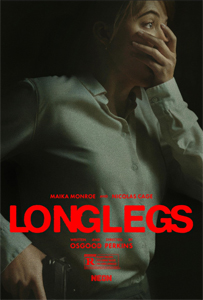An odd combination of rigid filmmaking and going for broke, “Longlegs” has enough good scenes and moments to be worth a look. As a complete product, it unfortunately confirms the adage that if you don’t have a good story, you don’t have a great movie.
Writer-director Osgood Perkins, much better at the latter skill, really wants to make an artistic horror-thriller like “Silence of the Lambs” or at least “Sinister.” The actors are game. An unrestrained Nicolas Cage adds to his arsenal of weird performances as the titular villain who behaves like the creepiest of kidnappers. In one hilariously bizarre scene, he plays peek-a-boo with a shop clerk, who calls to her dad to say that creepy guy is here again.
Maika Monroe is a subtler form of odd as neurodivergent FBI Agent Lee Harker. When her older partner, Carter (Blair Underwood), says she should come in and meet his family, she says “Can I say no?” Alicia Witt plays older than her age as Lee’s religious mother. And a strange one-off turn comes from an unrecognizable Kiernan Shipka.
“Longlegs” (2024)
Director: Osgood Perkins
Writer: Osgood Perkins
Stars: Maika Monroe, Nicolas Cage, Blair Underwood
This 1990s-set yarn is not technically a serial-killer pursuit story, but it uses that structure. A series of murder-suicides through the years are carried out by patriarchs of families for no apparent reason, and Longlegs was seen in the area before all of them. But if he is the killer, he somehow leaves no evidence.
“Longlegs” is a cold movie from the start, and it gets colder because the mystery never heats up, and the relationships remain distant. I feel like the movie should’ve instead gotten warmer, perhaps from the set-aside subplot about the awkward Harker hitting it off with Carter’s young daughter (Ava Kelders).
Cold cases, and an undercooked plot
Cinematographer Andres Arochi frames every focal element – whether a character or a doorway – precisely center-cut. Early on, this results in classic horror shots, like when Harker is alone in her woodsy yet large cabin. Our eyes dart to the shadows on either side behind her; we’re ready to call out a warning.
Arochi crafts several spectacular shots in the tradition of “The X-Files,” like when the agents investigate Longlegs’ barn. Their flashlights cut through the dust motes.
But as the film progresses, the spaces to the sides – since we’ve become accustomed to them being wasted – become empty, even if there are pictures or piles of junk to look at. The wide angles – used consistently except in 1970s flashbacks where the screen is cleverly shaped like old slides – incongruously make “Longlegs” claustrophobic.

Maintaining the chill, characters – even mother and daughter — rarely interact in intimate fashion. Osgood pulls off a neat character-building trick with Mrs. Harker. In phone calls only from Lee’s perspective, we assume Lee is an awkward conversationalist. But when we meet Mrs. Harker in person, she’s a religious nut and hoarder. Lee had been adjusting to her mother’s stilted chatter in those phone calls.
The first 60 percent of “Longlegs” is gripping because of the style and odd performances. But then it steadily gets sillier until it mercifully ends, and this is entirely due to the screenplay.
A devil’s bargain (Spoilers)
(SPOILERS FOLLOW.)
As it turns out, the villain is the Devil. He’s running an unnecessarily convoluted scheme wherein Longlegs recruits Mrs. Harker, who delivers Longlegs’ life-size dolls to people with children as supposed gifts from the church. Then the dolls – with a supernatural demonic ball for a brain – make the fathers slaughter the family.
It’s never explained why the FBI knows Longlegs is connected to these crimes yet does not know about Mrs. Harker or the dolls.
As a mystery, “Longlegs” throws empty tropes at the wall and none stick. Lee is a brilliant young agent because she studies evidence closely, a contrast to Carter, who can’t be bothered to think outside the box. At one point, Lee draws a triangle on a chart of dates; I guess it gets them a step closer to solving the case, but I have no idea why.
Although unnecessarily convoluted, the script falls back on conveniences when need be. Why does Lee not know about her mom’s activities? Why does the mom herself not seem to know? Because their brains have been made fuzzy by the Devil’s powers.
Ultimately, Lee and her mom aren’t necessary to the scheme. The Devil could’ve simply used Longlegs as his underling. I suppose the Devil likes to play twisted games. I guess if you blur your brain like the Harkers’, “Longlegs” almost makes sense.
(END OF SPOILERS.)
But the narrative convolutions keep it from greatness. Osgood might go on to make elite horror thrillers; one can’t quibble with his ambitious and influences. But using only “Longlegs” for evidence, he’s more likely to do it as a director than as a writer.

